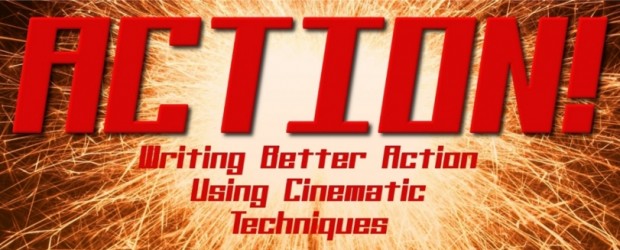Writing action scenes can be a tremendous amount of fun. Your characters can do all those stunts you’ve seen in movies, and you can invent entirely new predicaments for them. You have to be careful not to get too carried away with that fun, because it can result in some pitfalls that can ruin even the best-planned action scene.
Quick Cuts. This is a common problem when writers are trying to pull back and write from a “global” perspective. It’s easy to do because you, the writer, can see everything that’s going on in an action scene, and it’s tempting to write every bit of it, because that’s what writers do. Jumping around in a scene quickly, sometimes with as little as a single sentence devoted to one character followed by a sentence for another and so on, is the literary equivalent of the jump cut in cinema. Some directors have no sense of flow when it comes to an action scene, and they figure the frenetic camera cuts with shots lasting less than a second are a suitable equivalent.
Hint: they’re not.
Jumping around in your scene from character to character, like you’re trying to make sure everybody gets equal coverage, will make your scene choppy and have no flow to it. This in turn eliminates the possibility of one of the most useful aspects of action scenes: character development. As described in Part 1, an action scene can be an excellent vehicle for readers to learn more about the characters. If the scene has no flow to it because of quick cuts, this is an impossibility.
Headhopping. This is generally a no-no in all types of fiction. Headhopping is when the narrative has been focusing on a single character’s thoughts, words, and deeds, and suddenly in the middle of the scene the narrative switches to someone else’s focus without any obvious scene break. The equivalent might be if you’re playing a first-person-shooter video game and all of a sudden you’re a different character. Does that sound a bit jarring? Because in fiction it’s just as jarring, and in an action scene it effectively interrupts the flow as the reader has to figure out what just happened.
Purple Prose. We’re all writers, and we love words. It can be tempting to reach into one’s thesaurus to come up with beautiful and unusual words to perfectly capture the essence of our intent. Unfortunately, there’s no place for this in an action scene. Overwriting drags the pace of a scene down to a crawl as the reader has to try to follow the flow of action through a muddle of rich language. Along the same lines is the problem of the odd word choice. You may love the word conflagration, but a typical reader may not know it also means fire. I’m not saying don’t use rich language at all, but if a reader doesn’t know a word, it’s like hitting a roadblock as they look at it, go “Huh?” and have to deduce its meaning from the language around it.
Action Without Reaction or Consequence. In reality, if you get shot (and I hope you never do!), you’ll probably scream, piss yourself, vomit, go into shock, faint, or all of the above. On the other hand, heroes always seem to shrug off “minor flesh wounds,” tear off a strip of their shirt to bind them, and keep on going. This is what makes our heroes exciting: the ability to battle through pain that would reduce the rest of us to quivering piles of jelly on the floor. If your hero can be shot a dozen times and be fine later in the book, then what’s the point of her having been shot at all? Don’t forget the lasting consequences of wounds or injuries just because the action scene is finished.
Along the same lines, don’t forget that those chase scenes may leave dozens of innocent bystanders injured or killed, and cause thousands of dollars’ worth of property damage. Stray bullets from a gunfight can travel a long distance. If there’s no risk of consequence to the heroes, there’s no need for them to act like heroes. They can blow stuff up willy-nilly, which may be cool for the first five minutes, but will get boring and unrealistic quickly.
No Resolution. Finally, it’s important to remember that any Engagement or Sequence that fails to resolve even a minor plot point is completely gratuitous. A Sequence ought to resolve something major. If you have an idea for a car chase involving dump trucks and a drawbridge doesn’t mean you should put it in your book just because it looks cool. If nothing has changed for the plot between the moment the heroes climb into that dump truck and the moment the truck crashes to relative safety on the other side of the open drawbridge, you’re guilty of a Gratuitous Explosion. It doesn’t matter if it’s not an explosion. You know what I mean.
